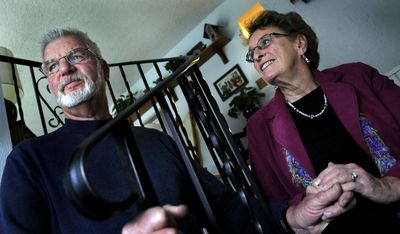Crisis cripples confidence, trust

Bob Lavigne has a decent understanding of what’s going on with the financial crisis.
He can talk about credit swaps, housing defaults, oil bidding and Chinese investment in the economy. And yet, after the last few tumultuous weeks he feels like he’s in the dark.
“I feel like I don’t know anything,” says Lavigne, a 57-year-old government consultant from Spokane, who says he’s rethinking retirement plans. “The future is not what you thought it was going to be.”
Lavigne says he doesn’t believe the government and financial officials are presenting the full picture. He’s like a lot of people around the region who feel like they’re at the mercy of a system they can’t understand or influence.
Some simply don’t follow it closely – like Spokane’s Tammy Judd, who says she’s been too scared to look at her retirement account. Others are deeply skeptical of the way the stock market operates, seeing it as a series of transactions that are opaque at best and corrupt at worst. They view the bailout and government intervention as something done to help “bigwigs” and not typical Americans.
“The trust issue is huge, and there is none,” said Bernadette Haddleton, a 70-year-old retiree from Post Falls.
Asked if she felt that she understands the underlying causes of the financial crisis, she said, “I’m not sure. I think I do. What it appears to me is it’s been a house of cards for a long time. Finally the plug got pulled and it all toppled.”
Kent Hickman, a professor of finance at Gonzaga University, said the complexity of the market and the difficulty people have understanding it could exacerbate the financial problem if it causes a loss in trust or confidence.
“No one understands it fully because it’s very, very complex,” Hickman said. “I’m not sure anyone has a firm grasp on the whole picture. That’s what makes explaining it, and more importantly, solving it, more difficult.”
Hickman took a stab at explaining the financial crisis to his wife, using George Bailey’s bank in “It’s a Wonderful Life” as a point of comparison. His wife liked the explanation so much that she urged him to write it down; his essay began making the rounds at Gonzaga and elsewhere. It was published last week in the Seattle Times. In Hickman’s “epilogue” to the movie, Jimmy Stewart’s character is not saved by the townspeople’s generosity; he’s fired but still enjoying the high life at his estate.
That captures a key attitude about the crisis for a lot of people. They see the market as distant and perhaps unconnected to their lives, and the bailout as an effort to enrich the wealthy, not help average people.
“These rich executives – basically we’re bailing them out of their own garbage they created,” said Bobbie Pinchak, a single mother who quit her job last year to return to college at Eastern Washington University. “But if we needed a bailout, would they give us one? No way.”
Judd doesn’t see the bailout as something that will help everyone. “It’s not going to do anything to help the people who are living paycheck to paycheck,” she said. “We’re trying to figure out if we want to put our money in a bank or just stick it under a mattress.”
Hickman said he understands why people feel that way, but helping stabilize the system benefits everyone. He uses another analogy to explain – the sinking of the Titanic. “We may have to save the captain who’s responsible for hitting the iceberg in order to save the rest of the passengers,” he said.
For all his skepticism about the market and how forthright top officials are being, Lavigne sees at least one direct connection between the recent turmoil and his own life – the same connection anyone who has a retirement account sees.
“The economy tanked, and so did my 401(k),” he said. “Whatever plan I had for retirement is no longer relevant. Everybody’s going to have to rethink their whole concept of retirement.”
Lavigne, who’s 57 and several years away from retirement, is hoping to catch the wave of a recovery before then. At 33, Judd hopes that by the time his retirement rolls around the current problems will be just a memory.
“If we just don’t look at it until it’s time to retire, then maybe we can retire,” said Judd, who works in medical billing and is married with two children.
For Haddleton and her husband, who have already retired, their relatively safe conservative investments haven’t been as hard hit by the recent volatility. But another piece of economic strife – skyrocketing prices – is putting a lot of pressure on the budget, she said.
“On a fixed income, the cost of groceries, the cost of fruits and vegetables, the cost of meat – our food budget goes out the window,” she said. “It’s all part of the house of cards.”
Hickman said that as consumers begin to rethink their behavior, there could be further repercussions for the economy. As people tighten their belts, there’s a ripple effect.
“If I quit spending money, it may affect Bob the barber,” he said. And if enough people follow suit, Bob the barber could find himself pinched, and unable to afford the new car he’d planned to buy.
“Now somebody gets laid off in Detroit because there’s a number of barbers cutting less hair,” Hickman said.
That’s why the questions of trust and confidence – the attitudes of typical consumers about the economy and their place in it – could be big factors in whatever happens next, he said. And how well people understand the economy is a part of that.
“It’s confusing,” Judd said. “I think most of us out there are uninformed. We don’t get it.”